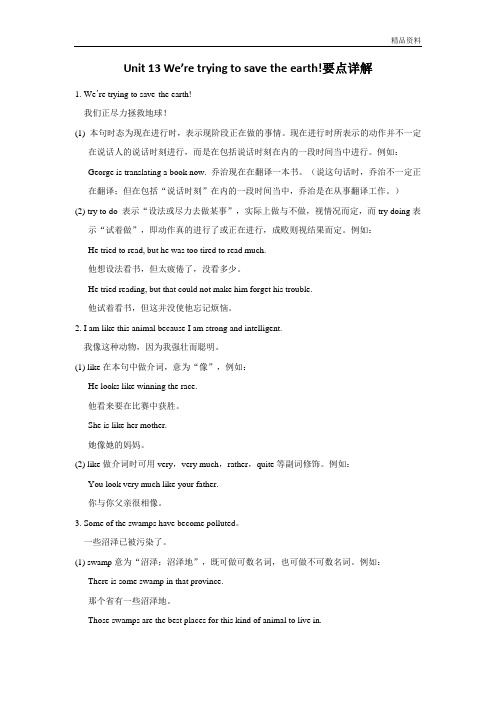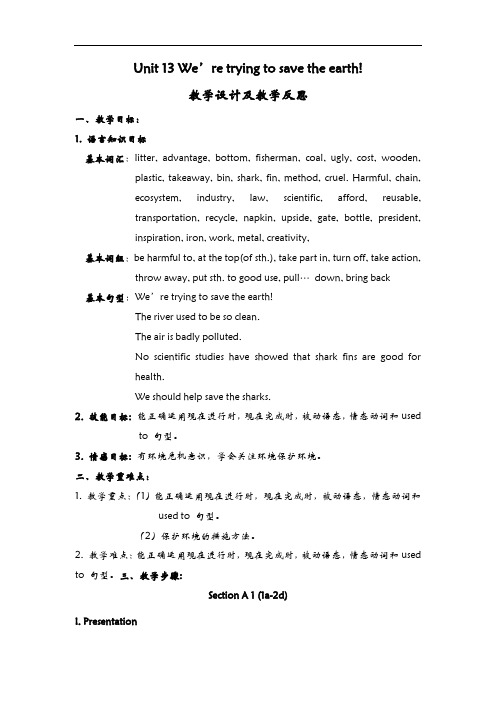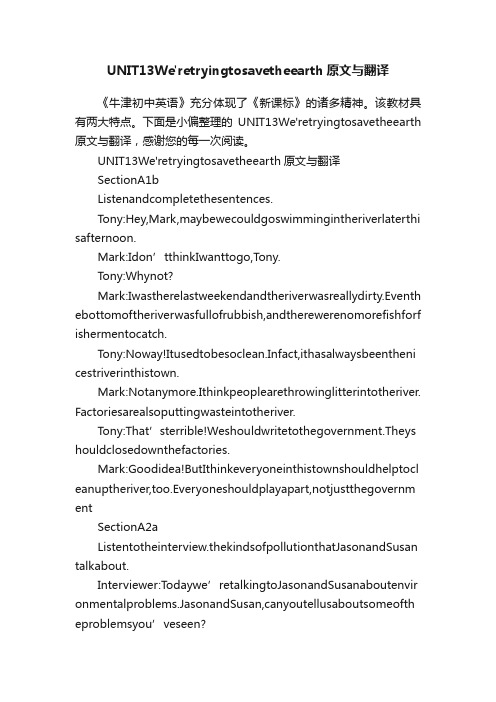(精品)Unit 13 We're trying to save the earth!标准检测 (新版)人教新目标版
- 格式:doc
- 大小:555.00 KB
- 文档页数:10

Unit 13 We’re trying to save the earth!要点详解1. We’re trying to save the earth!我们正尽力拯救地球!(1) 本句时态为现在进行时,表示现阶段正在做的事情。
现在进行时所表示的动作并不一定在说话人的说话时刻进行,而是在包括说话时刻在内的一段时间当中进行。
例如:George is translating a book now. 乔治现在在翻译一本书。
(说这句话时,乔治不一定正在翻译;但在包括“说话时刻”在内的一段时间当中,乔治是在从事翻译工作。
)(2) try to do 表示“设法或尽力去做某事”,实际上做与不做,视情况而定,而try doing表示“试着做”,即动作真的进行了或正在进行,成败则视结果而定。
例如:He tried to read, but he was too tired to read much.他想设法看书,但太疲倦了,没看多少。
He tried reading, but that could not make him forget his trouble.他试着看书,但这并没使他忘记烦恼。
2. I am like this animal because I am strong and intelligent.我像这种动物,因为我强壮而聪明。
(1) like在本句中做介词,意为“像”,例如:He looks like winning the race.他看来要在比赛中获胜。
She is like her mother.她像她的妈妈。
(2) like做介词时可用very,very much,rather,quite等副词修饰。
例如:You look very much like your father.你与你父亲很相像。
3. Some of the swamps have become polluted。
一些沼泽已被污染了。

Unit 13 We’re trying to save the earth!教学设计及教学反思一、教学目标:1. 语言知识目标基本词汇:litter, advantage, bottom, fisherman, coal, ugly, cost, wooden, plastic, takeaway, bin, shark, fin, method, cruel. Harmful, chain,ecosystem, industry, law, scientific, afford, reusable,transportation, recycle, napkin, upside, gate, bottle, president,inspiration, iron, work, metal, creativity,基本词组:be harmful to, at the top(of sth.), take part in, turn off, take action, throw away, put sth. to good use, pull…down, bring back基本句型:We’re trying to save the earth!The river used to be so clean.The air is badly polluted.No scientific studies have showed that shark fins are good forhealth.We should help save the sharks.2. 技能目标: 能正确运用现在进行时,现在完成时,被动语态,情态动词和usedto 句型。
3. 情感目标:有环境危机意识,学会关注环境保护环境。
二、教学重难点:1. 教学重点:(1)能正确运用现在进行时,现在完成时,被动语态,情态动词和used to 句型。



Unit 13 We’re trying to save the earth.Section A1. 辨别voice,sound和noise(1)voice一般指人旳声音,如说话,唱歌,但有时也可指鸟叫旳声音。
The girl has a beautiful voice.(2)sound指人能听见旳任何声音。
Sound travels more slowly than light.(3)noise常指不悦耳、不友好旳嘈杂声。
The noise wakes me up.The boy didn’t sleep well last night because of the_____from the factory.A.voiceB.noiseC.musicD.song2. (1)more是many和much旳比较级,既可修饰可数名词复数,也可修饰不可数名词,意为“更多旳”more students 更多旳学生more food更多旳食物(2)less是little旳比较级,修饰不可数名词,意为“更少旳”less polution较少旳污染(3)fewer是few旳比较级,修饰可数名词复数,意为“更少旳”fewer students较少旳学生(1)If there were more trees on the earth,there would be l pollution.(2)All of us want to do more work with time and workers.A;fewer;less B;less;fewer C;more;much D.less;more 3. (1)used to do sth.表达过去习惯性旳动作或常常性旳状态.He used to smoke,didn’t he?(2)be used to doing sth表达“习惯于做某事”My parents are used to getting up early.(3)be used to do sth=be used for doing sth是被动构造,表达“被用来做某事”The knives are used to cut things.=The knives are used for cutting things.(1)She used to with her parents, but now she is used to___with her classmatesat school.A. live; livingB.live; liveC.living; livingD.living; live(2)Keys______ used for ______ the doors.A. is, openingB. is, openedC. are, openingD. are opened4. 辨析:be able to和can(1)be able to可用于多种时态,表达通过努力而获得旳能力.(2)只有目前式(can)和过去式(could).表达自身已具有旳能力或有能力做某事.(1)He could play the guitar when he was five years old.(改为同义句)He play the guitar when he was five years old.(2)Work hard, and then you will ___ learn English well.A.canB.able toC.be able toD.are able to5. (1)alone表达“单独旳,独自一人旳”,不含感情色彩.做形容词时,只能在be动词或系动词之后做表语,做副词时,作状语,修饰动词,相称于by oneself.He was alone in the house. I went to the movies alone,I felt lonely.(2)lonely表达“孤单旳,寂寞旳”具有丰富旳感情色彩.lonely 做形容词时,可做定语和表语。

UNIT13We'retryingtosavetheearth原文与翻译《牛津初中英语》充分体现了《新课标》的诸多精神。
该教材具有两大特点。
下面是小偏整理的UNIT13We'retryingtosavetheearth 原文与翻译,感谢您的每一次阅读。
UNIT13We'retryingtosavetheearth原文与翻译SectionA1bListenandcompletethesentences.Tony:Hey,Mark,maybewecouldgoswimmingintheriverlaterthi safternoon.Mark:Idon’tthinkIwanttogo,Tony.Tony:Whynot?Mark:Iwastherelastweekendandtheriverwasreallydirty.Eventh ebottomoftheriverwasfullofrubbish,andtherewerenomorefishforf ishermentocatch.Tony:Noway!Itusedtobesoclean.Infact,ithasalwaysbeentheni cestriverinthistown.Mark:Notanymore.Ithinkpeoplearethrowinglitterintotheriver. Factoriesarealsoputtingwasteintotheriver.Tony:That’sterrible!Weshouldwritetothegovernment.Theys houldclosedownthefactories.Mark:Goodidea!ButIthinkeveryoneinthistownshouldhelptocl eanuptheriver,too.Everyoneshouldplayapart,notjustthegovernm entSectionA2aListentotheinterview.thekindsofpollutionthatJasonandSusan talkabout.Interviewer:T odaywe’retalkingtoJason andSusanaboutenvir onmentalproblems.JasonandSusan,canyoutellusaboutsomeofth eproblemsyou’veseen?Jason:Ithinkoneproblemisthattheairisbadlypolluted.Ihardlye verseeblueskiesanymore.Susan:Yes,andIusedtoseethestarsclearly.Interviewer:Whatdoyouthinkhascausedthisproblem?Susan:Well,therearemorecarsontheroadthesedays.Jason:Andfactoriesthatburncoalalsopollutetheairwithalotofb lacksmoke.Interviewer:Whatotherproblemsdoyousee?Susan:Iguessthere’stoomuchrubbishandwasteinthestreets.Jason:Yes!Everydaypeoplearethrowingawaythingslikewoode nchopsticks,plasticbowlsandplasticbags.Susan:They’realsolitteringinpublicplaces,forexample,durin gpicnicsinparks.Thisisturningbeautifulplacesintouglyones.Interviewer:You’reright.Theseareseriousproble msforourenv ironment.Next,let’stalkaboutthethingswecandotohelp.SectionA2bListenagainandcompletethesentences.Interviewer:T odaywe’retalkingtoJasonandSusanaboutenvir onmentalproblems.JasonandSusan,canyoutellusaboutsomeofth eproblemsyou’veseen?Jason:Ithinkoneproblemisthattheairisbadlypolluted.Ihardlye verseeblueskiesanymore.Susan:Yes,andIusedtoseethestarsclearly.Interviewer:Whatdoyouthinkhascausedthisproblem?Susan:Well,therearemorecarsontheroadthesedays.Jason:Andfactoriesthatburncoalalsopollutetheairwithalotofb lacksmoke.Interviewer:Whatotherproblemsdoyousee?Susan:Iguessthere’stoomuchrubbishandwasteinthestreets.Jason:Yes!Everydaypeoplearethrowingawaythingslikewoodenchopsticks,plasticbowlsandplasticbags.Susan:They’realsolitteringinpublicplaces,forexample,d urin gpicnicsinparks.Thisisturningbeautifulplacesintouglyones.Interviewer:You’reright.Theseareseriousproblemsforourenv ironment.Next,let’stalkaboutthethingswecandotohelp.SectionA2dRoleplaytheconversation.JasonandSusan,whatareyourideasforsolvingtheseproblems?Well,tocutdownairpollution,weshouldtakethebusorsubwayin steadofdriving.Yeah,orrideabike.Thereareotheradvantagesofbikeriding.It'sg oodforhealthitdoesn'tanythingGreatideas!Whataboutwastepollution?Mmm,Ithinksimplethingslikebringingabagtogoshoppingcan help.Istarteddoingthatayearago.Me,tooAlso,Inevertakewoodenchopsticksorplasticforkswhen Ibuytakeawayfood.Iusetheonesathome.Andremembertothrowrubbishinthebinsandkeeppublicplace scleanandbeautifulforeveryone.Sotogether,ouractionscanmakeadifferenceandleadtoabetter future!SectionA3aReadthepassageaboutsharksandcompletethefactsheetbelow.SavetheSharks!Manyhaveheardofsharkfinsoup.Thisfamousandexpensivedis hisespeciallypopularinsouthernChina.Butdoyourealizethaty ou’r ekillingawholesharkeachtimeyouenjoyabowlofsharkfinsoup?Whenpeoplecatchsharks,theycutofftheirfinsandthrowthesha rkbackintotheocean.Thisisnotonlycruel,butalsoharmfultotheenvir onment.Withoutafin,asharkcannolongerswimandslowlydies.Sharksar eatthetopofthefo odchainintheocean’secosystem.Iftheirnumber sdroptoolow,itwillbringdangertoalloceanlife.Manybelievethatsharkscanneverbeendangeredbecausethey arethestrongestintheirfoodchain.Butinfact,around70millionshark sarecaughtandtradedinthisindustryeveryyear.Thenumbersofsomekindsofsharkshavefallenbyover90percen tinthelast20to30years.Environmentalprotectiongroupsaroundthe world,suchasWildAidandtheWWF,areteachingthepublicabout“fi nning”.Theyhaveevenaskedgovernmentstodeveloplawstostopthesal eofsharkfins.Sofar,noscientificstudieshaveshownthatsharkfinsare goodforhealth,sowhyeatthem?Helpsavethesharks!SectionB1cListenandcheck(√)thethingsthatJuliaandJacktalkabout.Jack:Turnoffthelights,Julia.Itsaveselectricity.Julia:Oh,Iusuallydothat.Iwasjustinahurry.Jack:Isee.I’vejustreadabookwh ichgivesideasabouthowweca nsavetheenvironment.Forexample,youshouldturnofftheshowerw henyou’rewashingyourhair.Julia:Oh,Iwouldneverdothat.Ihaveveryshorthair.Itonlytakesaf ewminutestowash.Whatelsedoesitsay?Jack:Youshouldtakeyourownbagswhenyougoshopping.Julia:Oh,that’seasy.I’lldothatfromnowon.Whatelse?Jack:Peopleshouldstopridingincarsandstartridingbikes.Julia:Noway!Itwouldtakeme45minutestogettoschoolbybike!Jack:Butit’sgoodfortheenvironment!Besides,Ilikeridingmybi ke.Julia:Yes,andyoualsoliveclosetoschool!SectionB1dListenagain.Check(√)thethingsthatJuliaisdoingnow,thethings shewilldointhefutureandthethingsshewouldneverdo.Jack:Turnoffthelights,Julia.Itsaveselectricity.Julia:Oh,Iusuallydothat.Iwasjustinahurry.Jack:Isee.I’vejustreadabookwhichgiveside asabouthowweca nsavetheenvironment.Forexample,youshouldturnofftheshowerw henyou’rewashingyourhair.Julia:Oh,Iwouldneverdothat.Ihaveveryshorthair.Itonlytakesaf ewminutestowash.Whatelsedoesitsay?Jack:Youshouldtakeyourownbagswhenyougoshopping.Julia:Oh,that’seasy.I’lldothatfromnowon.Whatelse?Jack:Peopleshouldstopridingincarsandstartridingbikes.Julia:Noway!Itwouldtakeme45minutestogettoschoolbybike!Jack:Butit’sgoodfortheenvironment!Besides,Ilikeridingmybi ke.Julia:Yes,andyoualsoliveclosetoschool!SectionB2bReadthepassageandcompletethechartbelow.Rethink,Reuse,Recycle!Doyouoftenthrowawaythingsyoudon’tneedanymore?Have youeverthoughtabouthowthesethingscanactuallybeputtogoodu se?Nothingisawasteifyouhaveacreativemind.Youhaveprobablyn everheardofAmyHayes,butsheisamostunusualwoman.Shelivesin ahouseintheUKthatshebuiltherselfoutofrubbish.Thewindowsanddoorscomefromoldbuildingsaroundhertow nthatwerepulleddown.Thetopofthehouseisanoldboatturnedupsi dedown.Andthegateinfrontofherhouseismadeofrocksandoldglas sbottles.AmyrecentlywonaprizefromtheHelpSaveOurPlanetSociety.Thepresidentsaid,“Amyisaninspirationtousall.”Amyisn’ttheonlyonewhoisgoodatrecycling.JessicaWongfro mHongKongusesoldclothesthatpeop ledon’twearanymoretoma kebags.Shehasbeendoingthisforafewyearsnow.Sheopenedasmallshopwhereshesellsherbags,andshehasalso setupawebsitetosellthemonline.Sheespeciallylikestouseoldjeanst omakehandbags.Herbagsarecuteanduseful.“Iplantowriteabookaboutnewwaystouseoldclothes,”shesai d.“Ihopepeoplecanreadmybookandenjoyit!”WangTaosetupasmallbusinessinShanghaifouryearsago.Heisk nownforusingironandothermaterialsfromoldcarstomakebeautifu lartpieces.Somearelargepiecesthatlooklikeanimalsorhumans,and somearesmallerpiecesyoucanputathome.Themorepopularworks canevenbeseeninartshopsaroundthecity.WangTaohopestosetupa“metalart”themeparktoshowpeop letheimportanceofenvironmentalprotection.Notonlycantheartbri nghappinesstoothers,butitalsoshowsthatevencold,hardironcanb ebroughtbacktolifewithalittlecreativity.翻译:SectionA2d采访者:贾森和苏珊,对于解决这些问题,你们有什么想法?贾森:为了减少空气污染,我们应该乘坐公共汽车或者地铁,而不是开车。
Unit13 We're trying to save the earth!单词(带音标)及重点短语(可编辑)一、单词litter [litə(r)] v. 乱扔n. 垃圾;废弃物bottom [bɔtəm] n.底部;最下部fisherman [fiʃə(r)mən] n. 渔民;钓鱼的人coal [kəu l] n. 煤;煤块public [pʌblik] adj. 公众的;公共的n. 民众;百姓ugly [ʌgli] adj. 丑陋的;难看的advantage [ədva:ntidʒ] n. 优点;有利条件cost [kɔst; kɔ:st] v. 花费n. 花费;价钱wooden [wudn] adj. 木制的;木头的plastic [plæstik] adj. 塑料的n. 塑料;塑胶make a difference 有关系,作用,影响shark [ʃa:(r)k] n. 鲨鱼fin [fin] n.(.鱼)鳍cut off 割掉;砍掉method [meθəd] n. 方法;措施cruel [kru:əl] adj. 残酷的;残忍的harmful [ha:(r)mfl] adj. 有害的chain [tʃein] n. 链子;链条ecosystem [i:kəu sistəm] n.生态系统low [ləu[ a(.数量等)减少的;低的;矮的industry [indəstri] n. 工业;行业law [lɔ:] n. 法律;法规reusable [ri:ju:zəbl] adj.可重复使用的;可再次使用的afford [əfɔ:(r)d] v. 承担得起(后果);买得起transportation [t ænspɔ:(r)teiʃn] n. 运输业;交通运输recycle [ri:saikl] v. 回收利用;再利用napkin [næpkin] n. 餐巾;餐巾纸upside down 颠倒;倒转gate [geIt] n. 大门bottle [bɔtl] n. 瓶;瓶子president [prezidənt] n. 负责人;主席;总统inspiration [inspəreiʃn] n. 灵感;鼓舞人心的人(或事物)metal [metl] n. 金属creativity [kri:eitivəti] n. 创造力;独创性WildAid [waildeid] 野生救援协会(美国)WWF (World Wide Fund For Nature) 世界自然基金会Mark [ma:(r)k] 马克(男名)Jason [dʒeisən] 贾森(男名)Ken [ken] 肯(男名)Hayes [heiz] 海斯(姓)Jessica [dʒesikə] 杰茜卡(女名)二、重点短语1. environment protection 1. 环境保护2.air pollution 2. 空气污染3.noise pollution 3. 噪音污染4.water pollution 4. 水污染5.public places; 5. 公共场所;公共地方6.mobile phone; 6. 手机;可移动电证7.art pieces 7. 艺术品8.the food chain 8. 食物链9.scientific studies 9. 科学研究10.the number of... 10. 的数目11.take part in 11. 参加12.take action;12. 采取行动;采取措施13.turn off =shut off 13. 关闭=14.play a part in... 14. 在中起作用15.make a difference;15. 起作用;有影响16.pay for;16. 付费;付出代价17. put sth. to good use =make good use of 17. 好好利用=18. pull down;18. 撤山;摧毁19. cut down;19. 砍到;削减20.cut off...;20. 把……砍断开;截断21.add up...;21. 把加起来;加起来22.clean up ... 22. 把打扫干净23.throw away...;、23. 把扔掉;丢掉、24.bring back;;24. 拿回;归还;恢复25.lead to;25. 通向;导致26.can ’t afford to do sth. 26. 小能承担做某事27.build sth. out of... 27. 用来建造某物28.be made of... 28. 被用制造成30.be famous for..... 30. 因而山名31.be full of ...;...=be filled with 31. 充满;装满=32. be good for ... 32. 对有好处33. be harmful to ... 33. 对有害34. (be) in danger 34. 处于危险状态之中35. in the last twenty to thirty years. 35. 在过去的20 至30 年中36.at the top of sth ... 36. 在的顶部37.instead of ;37. 代替;取代38.upside down;38. 上下颠倒;倒转。
Unit 13 We’re trying to save the earth(第2课时)教学设计一. 教材分析《Unit 13 We’re trying to save the earth》是人教版初中英语教材八年级下册的一单元,主题是环保,旨在让学生通过学习本单元,增强环保意识,提高英语语言运用能力。
本单元的核心话题是节约资源、保护环境,通过讨论日常生活中的环保行为,引导学生关注地球生态环境,培养他们的社会责任感和使命感。
二. 学情分析八年级的学生已经具备了一定的英语基础,能够听、说、读、写一些简单的英语句子。
但他们在词汇、语法和口语表达方面还存在一定的困难。
因此,在教学过程中,教师应注重激发学生的学习兴趣,调动他们的积极性,引导他们主动参与课堂活动。
此外,学生对本单元的主题较为陌生,需要教师在导入环节做好相关铺垫。
三. 教学目标1.知识目标:–能够掌握本课的生词、短语和句型;–了解节约资源、保护环境的重要性;–学会用英语讨论日常生活中的环保行为。
2.能力目标:–能够听懂、会说、会读、会写本课的重点内容;–能够在真实情境中运用所学知识进行交流;–提高学生的环保意识和英语综合素质。
3.情感目标:–培养学生的环保意识,使他们认识到保护地球的重要性;–激发学生的社会责任感和使命感,鼓励他们为环保做出贡献;–增强学生的团队协作能力,培养他们的创新精神和实践能力。
四. 教学重难点•掌握本课的生词、短语和句型;•能够用英语讨论日常生活中的环保行为。
•正确运用情态动词进行表达;•在真实情境中运用所学知识进行交流。
五. 教学方法1.任务型教学法:通过设定各种真实的任务,让学生在完成任务的过程中运用所学知识,提高英语实际运用能力。
2.情境教学法:创设各种真实的语境,让学生在特定的情境中学习英语,提高他们的学习兴趣和积极性。
3.合作学习法:学生进行小组讨论、合作完成任务,培养他们的团队协作能力和沟通能力。
4.启发式教学法:教师引导学生思考、探究问题,激发他们的学习兴趣和求知欲。
Unit 13 标准检测(时间:100分钟满分:120分得分:________)一、听力理解(本大题分为A、B、C、D四部分,共25小题,每小题1分,共25分) A.听句子(本题有5小题,每小题1分,共5分)根据所听句子的内容和所提的问题,选择符合题意的图画回答问题。
每小题听一遍。
( )1.Why is the air in the city becoming worse and worse?A. B. C.( ) 2.How is the woman going to Moscow?A. B. C.( )3.How does Tom go to work?A. B. C.( )4.What does Maria usually do?A. B. C.( )5.What did they want to see?A. B. C.B.听对话(本题有10小题,每小题1分,共10分)回答每段对话后面的问题,在各题所给的三个选项中选出一个最佳答案。
每段对话听两遍。
听第一段对话,回答第6小题。
( )6.Where are the two speakers?A.In the zoo. B.In a store.C.At an aquarium.听第二段对话,回答第7小题。
( )7.What does the woman mean?A.They will help keep the place clean.B.They will help build a park.C.They will be allowed to drop rubbish.听第三段对话,回答第8小题。
( )8.What does the man mean?A.People save everything for others.B.People save everything for themselves.C.People needn't save anything for others.听第四段对话,回答第9小题。
( )9.What does the girl think of the tigers in cages?A.They are hungry.B.They should be sent back to nature.C.They must be kept in cages.听第五段对话,回答第10小题。
( )10.What's the man's idea in the dialogue?A.The earth was not as warm as it is.B.It's hard for people to stop the earth getting warmer.C.What people have done may make the earth get warmer.听第六段对话,回答第11—12小题。
( )11.When are they going to have a picnic?A.Next Sunday. B.This Sunday.C.Tomorrow.( )12.What are they going to bring for a picnic?A.A guitar. B.A violin. C.A camera.听第七段对话,回答第13—15小题。
( )13.When is Danny going to take his driving test?A.This Thursday.B.Next Thursday.C.Next Tuesday.( )14.Is Danny confident of his passing the driving test?A.Yes. B.No.C.It's not mentioned.( )15.Does the woman have her driver's license?A.Yes.She passed the test the fourth time.B.No.She has failed the test three times.C.No.She was too busy to take the test.C.听短文(本题有5小题,每小题1分,共5分)请根据所听内容,在每小题给出的三个选项中,选出一个能完成句子的最佳答案。
短文听两遍。
( )16.The speaker was looking for Chinese people all the time because________. A.he couldn't speak EnglishB.he felt lonelyC.he hated Americans( )17.The speaker's favorite activity is ________.A.reading B.running C.smoking( )18.The reading group got together ________.A.once a monthB.every two weeksC.every two months( )19.The reading group often met ________.A.in a restaurantB.in a houseC.in a restaurant or in a house( )20.The speaker thought reading together was a good activity because ________. A.they could learn a lot of new wordsB.they could learn new skillsC.they could forget all their problems at that timeD.听填信息(本题有5小题,每小题1分,共5分)在每小题的四个选项中,选出可以填入空白处的最佳答案。
( )26.I don't think you've been to Disneyland, ________?A.aren't you B.haven't youC.do you D.have you( )27.The villager built the bridge ________stones last year.A.out of B.out C.to D.for( )28.My brother watched the football match instead of ________ his homework.A.doing B.doC.did D.does( )29.—Do you know the movie Harry Potter?—Yes.I________ it twice.It's funny.A.saw B.seeC.have seen D.will see( )30.More natural protection areas should ________ in the future.A.set up B.to set upC.be set up D.setting up( )31.—Do you like playing computer games?—No, but I ________.A.used to B.didn'tC.do D.don't( )32.I have never________ the strange animal before.A.heard from B.listenedC.listened to D.heard of( )33.—Miss Liu, when did you come here?—In 2012.I________ here for two years.A.have been to B.have gone toC.have come D.have been( )34.Lots of food and water________ to Ya'an, Sichuan Province immediately after the earthquake happened.A.were sent B.are sentC.send D.sent( )35.The children were hungry and the salad was quickly________ up.A.eating B.ate C.eaten D.eat( )36.Look, so many passengers________ with their smart phones on the underground.A.played B.will playC.are playing D.have played( )37.Great changes________ in Daqing since the 1990s.A.took placeB.were taken placeC.have taken placeD.have been taken place( )38.—How much does the car________?—Oh, that's not too dear.It's only 100,000 yuan.A.spend B.cost C.take D.pay( )39.—Have you________ the school sports meeting?—Yes, I have.A.take part B.taken partC.taken part in D.took part in( )40.—What________ I do?—You'll________ study from now on if you want to go to college.A.can; may B.should; canC.should; have to D.may; could( )41.________ he ________ on well with his friends this term?A.Did; get B.Does; getC.is; gotten D.Is; getting( )42puters ________ process difficult problems very quickly.A.can B.mustC.should D.need( )43.Our teacher told us waste bottles should be________ good use.A.put B.put toC.to put D.puts( )44.—Is Tom coming by train?—He________.But he________ not.He likes driving his car.A.can; must B.may; canC.must; may D.should; may( )45.—John, your room is really in a mess.It needs________.—Sorry, Mum.I'll do it at once.A.cleans B.cleanedC.to clean D.to be cleaned三、完形填空(本大题有10小题,每小题1分,共10分)通读下面短文,掌握其大意,然后在各小题所给的四个选项中,选出一个最佳答案。